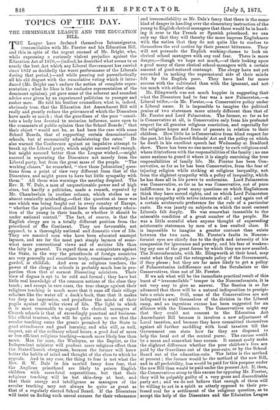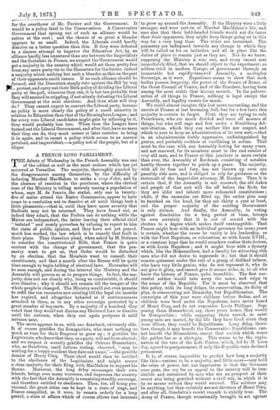TOPICS OF THE DAY.
THE BERMINGHAM LEAGUE AND THE EDUCATION
BILL. THE League have declared themselves Intransigentes, irreconcilables with Mr. Forster and his Education Bill, and this in spite of the urgent counsel of Mr. Bright, who, while expressing a curiously violent prejudice against the Education Act of 1870,-- (indeed, he described what seems to us nearly the best Act which any Liberal Government has carried since 1832 as decidedly the worst performance of the Liberals during that period,)—and while pouring out parenthetically all his old disgust with the cumulative voting which it intro- duced (Mr. Bright can't endure the notion of complete repre- sentation ; what he likes is the exclusive representation of the dominant opinion), yet gave some of the soberest and soundest advice ever given by an experienced politician to younger and rasher men. He told his brother counsellors, what is, indeed, obviously true, that the Education Act Amendment Bill will really and greatly reduce the grievance of which the Dissenters have made so much ; that the guardians of the poor "consti- tute a body less devoted to sectarian influence, more open to the comments of public opinion than the School Boards ;" that their object " would not be, as had been the case with some School Boards, that of supporting certain denominational schools, but of economically administering the rates." He also warned the Conference against an impulsive attempt to break up the Liberal party, which might succeed well enough, but might succeed better than the League wished,—might succeed in separating the Dissenters not merely from the Liberal party, but from the great mass of the people. "The working classes," he remarked, "view these [education] ques- tions from a point of view very different from that of the Dissenters, and might prove to have but little sympathy with them." All these wise warnings the meeting despised. The Rev. R. W. Dale, a man of unquestionable power and of high aims, but hardly a politician, made a remark, repeated by Mr. Chamberlain in another column, which strikes us as almost comically misleading,—that the question at issue was one which was being fought out in every country of Europe, "whether the priesthood should have the elementary educa- tion of the young in their hands, or whether it should be under national control." The fact, of course, is that the English clergy are in a totally different position from the priesthood of file Continent. They are favourable, not opposed, to a thoroughly national and domestic view of life. They are married men who have been educated amongst laymen, and are for the most part simply laymen of some- what more conventional views and of stricter life than the laity in general. To regard them as conspirators against the State, in the way the priesthoods of foreign countries are very generally and sometimes truly, sometimes untruly, re- garded, is childish. And even as religious teachers, the power of the clergy in schools is probably much less in pro- portion than that of earnest Dissenting ministers. Their view of dogma is apt to be cold and formal ; they have but little real knowledge of the common notions of the class they teach ; and except in rare cases, the true charge against their religious teaching is much more that it runs off their village scholars like the water off a duck's back, than that it makes too deep an impression, and prejudices the minds of their pupils against all wider views of life. The light in which it is most reasonable to regard the clerical managers of Church schools is that of exceedingly punctual and business- like official trustees, who will be quite sure to see that the secular teaching earns the grants promised by the State to good attendances and good learning, and who will, as well, impart, out of the ordinary school hours, a good deal of more or less efficient religious teaching—much more likely less than more. Man for man, the Wesleyan, or the Baptist, or the Independent minister will produce more religious effect than the State-Church clergyman, because the former will know better the habits of mind and thought of the class to which he appeals. And in any case, the thing to fear is not what the Rev. B. W. Dale in his morbid fancy does fear, that the Anglican priesthood are likely to poison English children with sacerdotal superstitions, but that their religious teaching will be but skin-deep at best, and that their energy and intelligence as managers of the secular teaching may not always be quite as great as that insist a regularly elected School Board. If the Dissenters
will on finding such unreal excuses for their vehemence
and irreconcilability as Mr. Dale's fancy that there is the same. kind of danger in handing over the elementary instruction of the young to English clerical managers that there would be in hand- ing it over to the French or Spanish priesthood, we can only say that they will thereby the more impress Englishmen. with the notion that they do not quite like to confess to, themselves the real motive foy their present bitterness. They- will not persuade the English working-classes to look on, clerical school managers with any real fear. There is more- danger,—though we hope not much,—of their looking upon, a good many of these clerical school-managers with a certain, amount of good-natured contempt. The clergy have not yet succeeded in making the supernatural side of their minds. felt by the English poor. They have had far more success with the cultivated than with the ignorant, and not too much with either class.
Mr. Illingworth was not much happier in suggesting that what the Dissenters had to fear was a new Palmerston,—e. Liberal trifler,—in Mr. Forster,—a Conservative policy under a Liberal name. It is impossible to imagine the political genius of two statesmen more utterly different than that of Mr. Forster and Lord Palmerston. The former, so far as he is Conservative at all, is Conservative only from his profound respect for all genuine religious conviction, and especially for the religious hopes and fears of parents in relation to their children. How little he is Conservative from blind respect for the past, let his Endowed Schools' Act and the policy on which he dwelt in his excellent speech last Wednesday at Bradford_ show. There has been no one more ready to curb religious zeal where it interferes with the responsibilities of the family ; no one- more anxious to guard it where it is simply exercising the true' responsibilities of family life. Mr. Forster has been Con- servative, so far as he has been Conservative, from the fear of injuring religion while striking at religious inequality, not- from the slightest sympathy with a policy of inequality, which he has done all in his power to undermine. Lord Palmerston was Conservative, so far as he was Conservative, out of pure. indifference to a great many questions on which Englishmen' think they have sacred rights, and on which Lord Palmerston. had no sympathy with active interests at all ; and again out of a certain aristocratic preference for the rule of a particular caste. He was jaunty on subjects on which the most earnest- Liberals felt deeply. He was somewhat insensible to the- miserable condition of a great number of the people. He. was a little scornful when anyone thought of superseding aristocratic statesmen by men of a less exalted class. It is impossible to imagine a greater contrast than exists between the two men. Mr. Forster's faults in Noncon- formist eyes are chiefly due to the depth and intensity of his compassion for ignorance and poverty, and his fear of weaken- ing any one of the great forces by which they are now assailed_ The Nonconformists, with Mr. Illingworth at their head, may resist what they call the retrograde policy of the Government,. if they please ; but they are far more likely to get a policy of Palmerstonian indifference out of the Secularists or the Conservatives, than out of Mr. Forster.
If we ask what will be the immediate practical result of this, burst of " irreconcilable " temper in the Nonconformists, it is. notvery easy to give an answer. The Session is so far advanced that there will be a natural indisposition to precipi- tate a crisis now. Still, some of the Conservatives are not indisposed to avail themselves of the division in the Liberal camp, and an ingenious excuse has been suggested for an alliance with the Dissenters. The Conservatives might say that they could not consent to the Education Act- Amendment Bill because it involves a new adjustment of Local taxation, and because they have committed themselves against all further meddling with local taxation till the Government can state how far they are disposed to, help the local out of the central purse. The excuse would be a mean and somewhat base excuse. It cannot really make the slightest difference whether the poor child, en's fees are paid by the Guardians out of the poor-rate, or by the School Board out of the education-rate. The latter is the method at present ; the former would be the method of the new Bill, and in all probability, less would be paid for this purpose under the new Bill than would be paid under the present Act. If, then, the Conservatives stoop to this excuse for opposing Mr. Forster, they will be palpably guilty of a very gross and discreditable party act ; and we do not believe that enough of them will be willing to act in a spirit *so utterly opposed to their pro- fessed zeal for a settlement of the religious question, as to accept the help of the Dissenters and the Education League for the overthrow of Mr. Forster and the Government. It would be a policy fatal to the Conservatives. A Conservative Government that sprang out of such an alliance would be rotten at the root ; and the chance of so great a blunder appears to us small. Indeed, the Liberals could hardly dissolve on a better question than this. If they were defeated in a sincere attempt to improve the Education Act, by an alliance hardly less unnatural than one between the Imperialists and the Socialists in France, we suspect the Government would get a majority in the country which would set them pretty free from any mere party-tie to the Dissenters for the future, indeed a majority which nothing but such a blunder as this on the part of their opponents could ensure. If no such alliance should be formed, and the Dissenters simply vote against the Bill by way rt. protest, and carry out their Bath policy of dividing the Liberal party at the poll, wherever they can, it is but too probable that they will succeed in crippling, if not utterly defeating the Liberal Government at the next elections. And then what will they do ? They cannot expect to convert the Liberal party, because no policy is more clearly the policy of a small minority in relation to Education than that of the Birmingham League ; and for every vote Liberal candidates might gain by adhering to it, they would probably lose two. When then the League have turned out the Liberal Government, and after that, have no more that they can do, they must sooner or later contrive to bring it in again, and to recast a policy which seems to us narrow petulant, and improvident,—a policy not of the people, but of a clique.



































 Previous page
Previous page